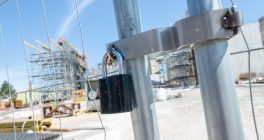At last!!! Good news as UK construction output experienced a much slower decline in January compared with the end of 2019 as client demand increases, according to the latest construction PMI.
The latest construction PMI revealed that new business volumes were also close to stabilisation, which contrasted with the sharp falls seen in the final quarter of last year.
The seasonally adjusted IHS Markit/CIPS UK Construction Total Activity Index recovered from 44.4 in December to 48.4 in January. The latest analysis was still below the 50.0 no-change threshold, but signalled the slowest fall in overall construction output for eight months.
Housebuilding holds up construction activity
Housebuilding was the best performing broad area of construction activity, with output falling only slightly in the January construction PMI. While residential work fell at the slowest pace since May 2019.
Commercial activity decreased for the thirteenth consecutive month in January, but the rate of contraction was much weaker than in December and the softest since the start of 2019. A number of survey respondents noted that reduced domestic political uncertainty had the potential to unlock new projects and provide an additional boost to client spending.
Civil engineering continues to struggle
Civil engineering was the worst-performing category of output in January, with construction firms often citing a lack of tender opportunities to help replace completed infrastructure contracts.
January construction PMI data indicated only a slight drop in new orders received by construction companies. The rate of new business contraction eased sharply since December and was the least marked in the current ten-month period of decline. Anecdotal evidence suggested that greater clarity in relation to Brexit following the general election had a positive impact on demand.
The latest survey pointed to a modest degree of pressure on supply chain capacity, with lead-times from vendors lengthening slightly despite a drop in purchasing volumes at the start of 2020.
However, subcontractor availability improved for the first time since last September and at the fastest pace for three and a half years.
Looking ahead
Construction companies are now the most optimistic about their growth prospects since April 2018. A number of firms noted that clients’ willingness to spend had picked up after the general election, which should translate into rising workloads over the course of 2020.
Duncan Brock, group director at the Chartered Institute of Procurement & Supply, commented:
“With the strongest optimism since April 2018, construction firms were more upbeat in January as the downturn in business activity slowed, the trend improved for new work and job losses steadied to August 2019 levels, all signalling a moderation in the sector’s contraction.
“Though the overall Index still registered below the no-change neutral mark, the signs are good that the sector is building up momentum for the year ahead and recovering some losses in new work which will ease concerns that the last bout of uncertainty has inflicted irreparable damage on the sector.
“Job losses are still in evidence overall and with an increase in subcontractor use, it appears the sector is looking for short-term fixes to manage current workloads. Construction firms are not yet ready to scale up plans to increase workforces in the coming months without a stronger economic and political recovery clearly in sight.
“So, though this rebound is a welcome sign, as with all sudden improvements, the danger remains the sector could easily recoil and shrink again. The domestic political situation and the UK’s attempt to find its place in the world remains littered with obstacles so businesses could find themselves on this see-saw of good and bad news for some time yet.”
Conservative government acts as a ‘release valve’
Brendan Sharkey, head of construction and real estate at MHA MacIntyre Hudson, added:
“The conservative election victory has acted as a release valve for a certain amount of pent-up energy in the sector. Contracts left on the back burner over the period of Brexit uncertainty are finally come to fruition. Yet it is far too early to tell if this bounce will lead to a sustainable rebound or just represents a fleeting flash of confidence in a sector struggling with low margins and a lack of government investment.
“The decisions the sector would like to see the most are those pertaining to the big delayed infrastructure projects, especially HS2 but also the third runway at Heathrow. Leading companies are already heavily invested in these projects even if they are not as yet putting the forecasts for the costs of the work into their usual financial projections.
“Undertaking a major construction project is like fighting a battle; manpower and resources have to be at the right place at the right time, so they need to be organised and budgeted for well in advance. The big firms have already made assessments about how much of their workplace to allocate to the projects currently awaiting government approval and they will take a hit if the government does not give the green light.”




